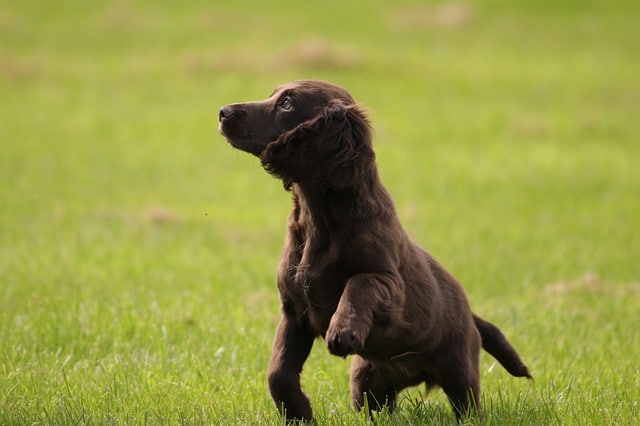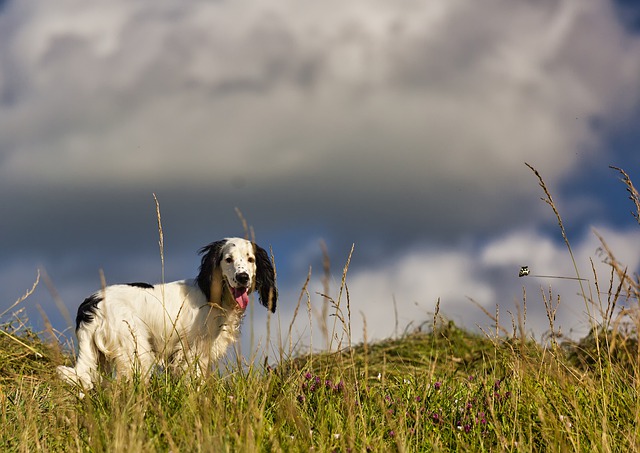Cocker spaniels are one of the sweetest family dogs around—for good reasons.
They are playful, loving, and their gentle nature makes them excellent companions.
Cockers are also highly intelligent and are known to make loving, enthusiastic playmates for kids and other pets.
Bred to work, these dogs love nothing more than spending quality time with their owners.
If you are getting a new cocker puppy, however, it is vital to understand that there are two distinct strains of the breed: the Working (or Field) type and the Show type, with each having different qualities and bred for different purposes.
As their name suggest, working or field cockers are usually bred as working gundogs, which implies that they have high hunting drive and can comfortably stay all the day in the shooting field.
But most of them are currently being sold to non-hunting pet homes, where they also make very great family dogs, especially if they land in the hands of an active dog parent.
Working cockers are also becoming more popular in a wide range of canine sports, including agility and fly ball competitions.
So, do working cocker spaniels make good family dogs? What is the difference between Working and Show cocker spaniels in the first place? How do they compare with other gundogs? What are their temperaments?
To help you understand this strain of cocker spaniels better, this post will be answering all these questions plus other common frequently asked questions about the breed.
Let’s dive right in…
1. What Is A Typical Working Cocker Spaniel Temperament?
Working cocker spaniels are active, busy, lively, friendly, gentle, faithful, adaptable, and can live happily in all kinds of households.
Bred as gundogs, working cocker spaniels have natural instincts to work, which implies that they are intelligent, kind, and willing to please their owners.
Working cockers are known to stick to their owners like glue and their loyalty is touted to melt even the coldest hearts.
So, if you decide to welcome a working cocker in your home, you’ll never be lonely or bored again.
These dogs are also highly sociable and enjoy being around children and pets.
Although they are intelligent and easy to train, sometimes they can be strong-willed, so patience and consistent training from puppyhood is highly recommended—as is the case for any dog breed out there.
2. What Is The Difference Between Working and Show Cocker Spaniels?

When they are still puppies (between 10-12 weeks), the two strains of cocker spaniel look pretty the same in terms of their appearance.
As such, if you are buying a cocker puppy for the first time, you can easily mistake a working cocker for a show cocker!
So, what’s the difference?
First things first, both cocker strains came from the same type of dog—the original cocker spaniel bred to flush woodcock.
So, their temperaments are the same: they are both friendly, make great family pets, and are very biddable.
However, they differ slightly when it comes to appearance. Working cockers are a bit leaner and tougher than their show cocker counterparts.
Here is a quick comparison of their main physical attributes:
| Features | Working Cocker Spaniels | Show Cocker Spaniels |
| Skull | Flatter | More domed |
| Ears | Higher set and shorter | Long and set lower on the side of the head |
| Coat | Slightly curly but with less feathering. | Long, silky coats with feathering (especially in the hind legs, forelegs, and body) |
| Body Shape | Wide, longer, less angulated bodies | Shorter bodies, big ribs & shorter lions. More angulated bodies |
| Colors | Varied but many have solid colors with extensive areas of white on muzzles, chests, etc. | Varied but white colors is allowed in solid color coats except on the chest |
| Eyes | Bright with tight eyelids | Droopy/loose eyelids (due to lose skin on the face) |
3. Why Are Working Cocker Spaniels Outnumbering Springers And Other Gundogs In The Fields?
The popularity of working cocker spaniel as a gundog has soared over the past few decades, even outdoing Springers in the field.
So, why has the gundog community fallen in love with the working cocker?
Well, first off is their unwavering courage. The last thing any hunting enthusiast wants to see in the hunting field is a dog that is fearful at a time when his services is needed the most.
The hunting community continues to add working cocker to their retriever teams because this strain of cocker spaniel can go where other gundogs fear to tread.
Working cockers hunt fearlessly with unprecedented zest and enthusiasm.
Secondly is their size. A hunting dog has to run for miles when tracking prey.
As such, they should have excellent shape and stamina for him to last during long hunting trips.
You can be with a working cocker in the field the whole day and still be ready for more.
Besides stamina, these dogs are also blessed with another attribute that both hunting and non-hunting pet owners adore: their small size.
Working cockers are smaller than most gundogs, allowing them to get through thickets with ease.
Pet parents who don’t have a lot of space (like people living in apartments) also prefer cockers to other big dogs because they need less space.
They don’t consume a lot of food either, which implies that your food bills will be lower than other pet owners with larger dog breeds.
The hunting community also loves dogs that are obedient and can please their owners.
A dog that devours his prey or scares prey with loud barks is usually a frustrating companion for any hunter.
A working cocker is loyal, kind, always eager to please, listen to commands, and very easy to train for hunting purposes.
In addition, depending on the type of prey, a great gundog should be able to pick pace at given moment and maintain the pace until you are done with the day. This is particularly important if you are going for longer hunts that require a lot of time.
The endurance of working cocker spaniels is in a level of its own. These dogs can peg patiently or rootle in the undergrowth for hours without showing any signs of weariness.
Finally, working cockers come in a wide range of colors than any other gundog breed.
Whether you are looking for bicolors, particolors, tricolors, solids, roans, you will be spoilt for choice if you decide to check a cocker litter.
Add all the above attributes to working cocker’s superior intelligence and you will begin to see why these dogs have become more popular with the gundog community, the police, and border agencies.
4. Can Working Cocker Spaniels Be Left Alone?
The short answer is: It is not recommended.
Working cockers are not sedentary dogs, so they need extra mental stimulation to keep them occupied.
If left alone without enough physical and mental stimulation, a working cocker will become bored, may develop separation anxiety, and even become destructive.
We understand that because of busy working schedules, you may need to leave your pup alone for longer than you would love to.
If you find yourself in such situations, here are a few strategies you can leverage to ensure that your working cocker is at least occupied:
- Take him for a long walk before you leave. This will tire him up so that he sleeps contentedly when you are away.
- Take him to a nearby dog boarding facility or ask a neighbor or a friend to pop a few times in the course of the day to let him out for some fresh air, potty breaks, and some playtime.
- Leave him with his favorite toys and in a safe room with comfy bed.
Related Posts:
12 Best Calming Dog Beds in 2021
Dog Boarding For Aggressive Dogs: Everything you Need to Know
5. Can Show Cockers Be Trained To Be Gundogs?
Yes, it is possible. Although the show cocker spaniels are bred to be family pets, they still have the ability to work considering that cocker spaniels were original bred to work.
They are also intelligent and will be easy to train in the fields. However, there are a few caveats.
To begin with, while your show cocker will have some instinct to run back and forth, he may not have the high prey drive that you expect of a gundog.
He may also be vulnerable to a lot of injuries when romping the undergrowth due to his loose skin around the eye and his more feathery coat and full tail.
6. Do Working Cocker Spaniels Calm Down?

Working cockers rarely clam or slow down.
Because they are active, high-energy dogs with natural instincts to work, cockers always manifest hyperactive temperament.
Your working cocker will always be ready to play, give you lots of kisses, go for walks, run through the yard, and get involved in some of the activities that you like to do around him.
However, there are several strategies that you can leverage to control this behavior, including:
- Find the right type of exercise that can exhaust your fur baby enough to be more relaxed. Exercise will not only engage him physically and mentally but can also be an excellent way for you to connect with your dog.
- Provide a lot of toys for your working cocker to play with around the house. Consider changing toys on a weekly basis to create continual interest in your dog.
- Change your daily routine with your dog. Consider changing things like your walking route, time of the day you go for exercise with him, and the dog parks you visit. All these will provide continual stimulation that tires and calms him down.
- Ensure that your working cocker has comfy space to relax and unwind. This will not only calm him down but will also promote his emotional and mental wellbeing.
- Create time for cuddles and snuggles. Considering that cockers love cuddles and kisses, denying him a chance to enjoy these moments can make him become disconnected and feel nervous.
Related Post: 10 Dog Breeds that Don’t Like to Cuddle
7. Do Working Cocker Spaniels Bark A Lot?
First things first, all dogs bark—that’s a fact of life.
However, some breeds tend to yap more than others and your lovely working cocker is among the most notorious barkers around.
But don’t fret because it is their natural way of letting you know that something is wrong somewhere.
The good news is that it is a behavior that can easily be controlled, especially if you take your time to understand what’s actually making your dog bark.
Besides, barking in dogs has some genetic component to it.
In other words, if your cocker’s parents are very vocal, then there are high chances that your cocker puppy will be the same.
So, if you find barking annoying, then choosing a quiet pup from quiet parents will boost your chances of having a less noisy working cocker.
Related Post: 15 Small Dog Breeds That Don’t Shed or Bark
8. What is the average life expectancy of a working cocker spaniel?
The life Expectancy of a working cocker is about 12-15 years.
A healthy and well-cared for working cocker could live longer, especially if exposed to activities that offer him enough physical and mental stimulation.
9. Do Working Cocker Spaniels Shed?
Yes. Working cockers have double coats, meaning that they will need to strip their dead undercoats during shedding seasons.
Expect some hair around your home, especially if you don’t brush your pup regularly.
You may also notice an uptick in molting during fall or spring for a few weeks.
However, they shed moderately or less than many dog breeds.
If you compared him to a Labrador retriever, for instance, you will quickly notice that it’s nowhere near as noticeable.
10. How Do You Find Good Working Cocker Spaniel Breeders?
Once you’ve decided to become a working cocker parent, you’ll want to know how to find the right puppy. And your next step will be to find good working cocker spaniel breeders.
One of the biggest problems with working cockers breeding is the fact that popular working sires, especially those that have been successful as trailing dogs, have been used too often as studs.
If you check a local cocker pedigree, therefore, it is quite common to see the same stud dog’s name on both a dam’s and sire’s side.
So, what can you do find a good working cocker puppy or how do you find a good breeder?
Well, here are a few tips to keep in mind:
- To be certain that the puppy you are about to purchase is a working strain and not a show strain, check his pedigree. Puppies from show lines are often listed as “Sh. Ch.” or “Show Champion” while those from working lines are listed as “FTCH” or “Field Trial Champion”.
- Check the COI (or the coefficient of inbreeding) of the puppy you plan to purchase. This way, you have an overview of how inbred your dog is. Learn more here.
- Work with working cocker spaniel breeders who are approved or registered with major kennel clubs. This will allow you to check whether your working cocker puppy’s parents have had their BVA/ PRA/AMS health checks.
- Insist on meeting the parents of the puppy you plan to purchase. This will allow you to get an overview of the appearance of your dog when he grows up, his size, and temperament.
Of course buying a puppy from KC registered breeders is not going to be cheap but it is worth it.
It helps eliminate unscrupulous and irresponsible working cocker spaniel breeders and can go a long way in saving you a lot of headaches down the road.
11. What Are Some Of The Potential Drawbacks Of Owning Working Cockers?

Generally, working cockers make excellent family pets due to their intelligence, sociable nature, and eagerness to please and get involved in most family activities.
However, like any other dog breed, there are a few cons to expect from this strain of cocker spaniel, including:
- Need a Lot of Exercise: A working cocker is not going to thrive well in a home that can only offer him limited exercise opportunities or where the owner doesn’t have the time or inclination to get involved exercises or activities that provide enough mental stimulation.
- Boredom: Working cockers have low attention span and tend to get bored fast. The trick is to ensure diversity in his daily routines, toys, food, etc. You should be able to tell when they’ve had enough of an activity.
- May Be Hard Headed: Working cockers are independent-minded and may sometimes be more hard headed than a Springer. As such, you may sometimes be required to keep a close eye on them a little more. If you allow them to get away with something, they may continue to do so for long.
- Health: Cocker spaniels are more prone to pyometra and mammary cancer, so you may need to spay your female cocker to prevent those conditions. Additionally, since cockers have floppy ears, they are prone to ear problems. Both working and show cockers are also prone to PRA blindness and hip dysplasia. Before buying a puppy, therefore, ensure that the puppy’s parents are health tested for the mentioned conditions.
Related Post:
12 Best Joint Supplements for Dogs with Hip Dysplasia
10 Best Dog Knee Braces for Dogs with Luxating Patella (Grade 1 & 2)
Conclusion
If you are looking for a working dog that is energetic, loveable, and social, your search should end with a working cocker spaniel.
And whether you plan to use him as a gundog, assistant dog, a sniffer dog, or in other sporting activities, this breed will never disappoint you.
Provided that he socialized early and exposed to the right training early enough, a working cocker will always make a good companion.
As an Amazon Associate, we may receive a small commission from qualifying purchases but at no extra cost to you. Learn more. Amazon and the Amazon logo are trademarks of Amazon.com, Inc, or its affiliates.

